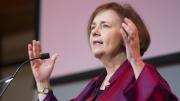New York Times columnist Gail Collins, author of When Everything Changed: The Amazing Journey of American Women from 1960 to the Present, gave this year’s Maurine and Robert Rothschild Lecture at the Radcliffe Institute for Advanced Study on October 22. Collins joined the Times in 1995; her roles there have included stewardship of the editorial page. In introducing Collins, historian Nancy Cott, Pforzheimer Foundation director of the Schlesinger Library, noted the refreshing tone of her columns: “not cynical, but optimistic.”
Collins mostly told stories from the years of the mid twentieth century, just before the feminist revolution of the 1970s, to illustrate how much social attitudes toward women have shifted since then. She began with an anecdote about a New York woman who was evicted from traffic court in 1960 for trying to pay a parking ticket while wearing slacks. “Women I meet from the 1950s, ’60s, and ’70s always have a story about slacks,” she said. At that time, women “weren’t moving around much,” she added, observing that the exceptions to this rule were airline stewardesses. Theirs was the most glamorous job a woman of that era could aspire to; only one of 100 applicants was hired, and the average tenure was only two years, because stewardesses were prohibited from marrying. Collins explained that the airlines even checked marriage notices in newspapers to verify their employees’ single status; one stewardess who married secretly was found out this way and removed from a flight during a stop in Chicago.
“There was nothing illegal about any of this,” Collins observed. Women weren’t allowed to serve on juries in parts of the South, and women everywhere had to get male co-signers for apartment leases, loans, and other financial and legal documents. “Men were there to run the public world—business, politics, religion,” she said. “Women were there to run the household.”
Then, in a 10-year period, it all changed. And “public opinion followed on this almost overnight,” Collins added. She explained that the civil-rights movement had sensitized the American public to issues of fairness. The advent of the birth control pill in 1960 raised average marital ages for women and made it more feasible for them to enter careers, like medicine, that require extensive training. Even now, the few women in the U.S. Senate generally are elected at older ages than their male counterparts, as they cannot really get started in politics until their children have grown a bit.
“In the United States, you are not taken seriously if you don’t have an economic role,” Collins opined. “That was the great mistake of the suffragists—it was not enough to vote.” In summary, she declared, “All of history was one way, and I lived through the moment when all of that changed. This all happened to create a platform for the younger generation to jump off and fly wherever they are going to fly.”









